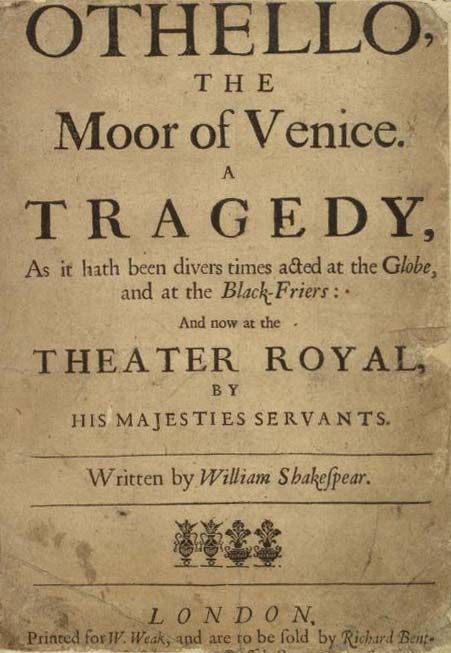Amongst the plays I've been reading to get a sense of what ideas about immigration were like in the early 1600 is Othello. Last night, I was lucky enough to see an electrifying performance at the National Theatre, with Adrian Lester in the title role and Rory Kinnear playing Iago. The reviews have been ecstatic. Quite right: at the climax, there was not a person in the house who did not have hairs standing up on the back of their necks.
It's 'the curse of service' says Iago at the start, to have to serve as Othello's lieutenant - awful to have to work for a foreigner; better to be his hangman, smirks one of his friends. We don't want his sort around here, they agree, slapping each other's backs.
So does Desdemona's father, whom Iago and his friend resolve to 'poison his delight', 'plague him with flies' and shame him in the streets by shouting that his daughter had married a foreigner - who right now, they tell the old man gleefully, is 'making the beast with two backs' with his daughter; an 'old black ram is topping your white ewe' as we speak, they say.
| It's the sort of language senior UKIP politicians use, such as MEP Godfrey Bloom, who recently addressed a meeting about Women in Politics by stating that 'this room is full of sluts'; and then, when this met with outrage, dismissed it - as Iago would doubtless have done by saying that 'it was fun. It was a joke and most people in Britain have a sense of humour.' Presumably, those born here. |
Iago and his friend Rodrigo can barely bring themselves to acknowledge what is blindingly obvious to them: foreigners; they take the jobs and marry the girls. If there had been a welfare state in Tudor times, they'd have accused Othello of defrauding that too - scrounging benefits, getting hospital treatment on the cheap and more besides. Othello's rise to the top is resented by people who feel more should be done for the local population than these newcomers - regardless of talent.
Shakespeare makes mincemeat of these narrow-minded, jealous and selfish little Englanders, who put their closeted views and ideas of personal gain ahead of what is good for the country: ultimately, Venice loses one of its great commanders - who knew better than anyone how to defeat a powerful and resourceful enemy. Driven into a frenzy of jealousy, [spoiler alert!], Othello kills his wife and then himself. The jealousy and individual advancement comes before the common good of the state; there are no winners.
But this of course is what all politics is about: you can't win. What prevails are the mind-games, manipulation and Machiavellian scheming. Innuendo, leaks, spin-doctoring and briefing against rivals, carried out from under the veil of the ends justifying the means. The appalling slurs on politicians' parents, their backgrounds, their private lives are par for the course in a world that has lost its way, where the individual counts for everything. The Miliband fiasco this week is one example; Damien McBride's new book out this week: Iago & Proud would have been a good sub-title.
| Ever the realist, Shakespeare does not stop by throwing stones. Instead, he offers an answer: put women in charge. This is implicit in the wonderful female characters in the play who are honest, noble and paragons of virtue. They sacrifice themselves for their beliefs, and behave as they should. In contrast with the idiotic cast of men who will say and do anything if they think it helps them, it is the women |
So there we go: Shakespeare, who as always is right about everything, has the answer for contemporary voters and politicians alike: don't vote UKIP; and get more women in politics. I could not agree more.
Now. Back to Islam in the Mediterranean in the 16th century.




 RSS Feed
RSS Feed